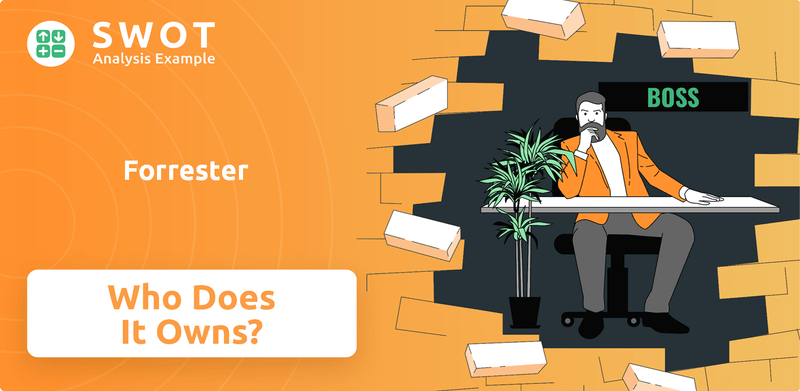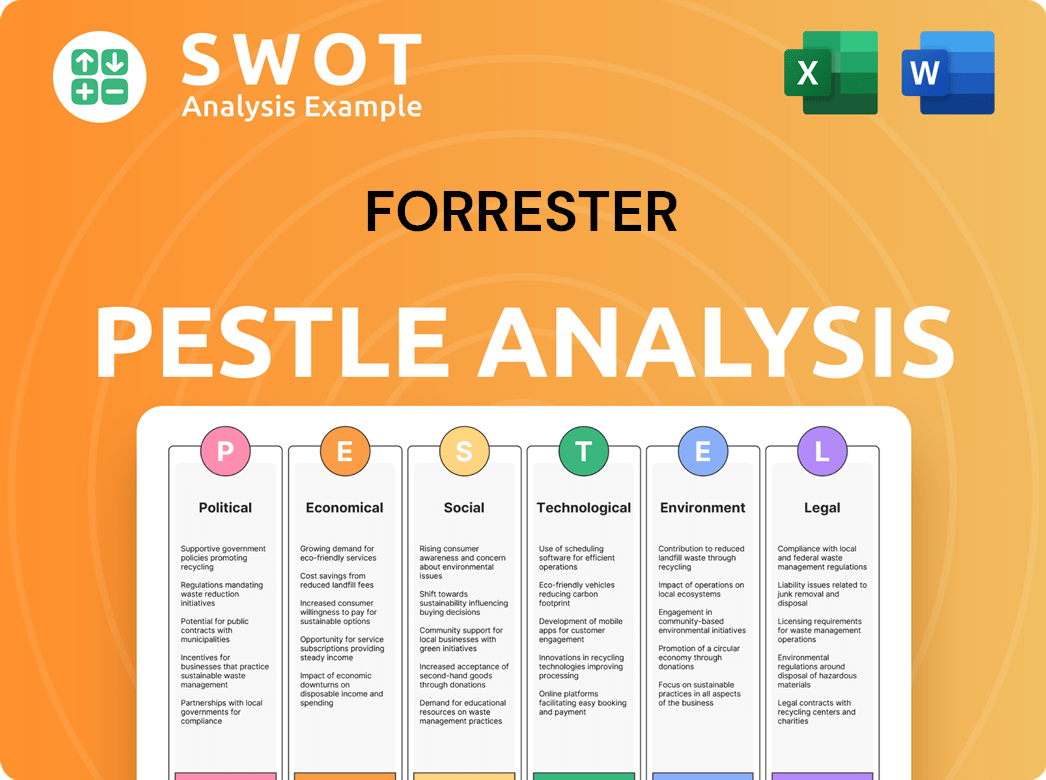Forrester Bundle
Who Really Owns Forrester Research?
Understanding the ownership of a company like Forrester Research is key to grasping its strategic moves and market influence. Since its IPO in 1996, Forrester has been a publicly traded entity, but who holds the reins today? This exploration dives deep into the Forrester SWOT Analysis, major stakeholders, and the evolving landscape of its ownership.

Founded in 1983 by George Forrester Colony, Forrester Research has grown into a global powerhouse. This article will examine the ownership structure of the Forrester company, including the role of its executives and major shareholders. We'll explore how the company's ownership has shaped its trajectory and its impact on Forrester market share, providing insights for investors and business strategists alike. The aim is to provide a comprehensive Forrester Research company profile.
Who Founded Forrester?
The origins of Forrester Research trace back to July 1983, when it was founded by George Forrester Colony in Cambridge, Massachusetts. From its inception, Colony has played a pivotal role in shaping the company's direction.
While the initial ownership details are not publicly available, George F. Colony remains the largest individual shareholder of Forrester Research, holding a substantial percentage of the company's stock.
The company's evolution from a small operation to a recognized research firm was initially self-funded, marking a significant phase in its development before transitioning to a publicly traded entity.
George Forrester Colony founded Forrester Research and has been instrumental in the company's direction since its beginning. He also serves as the Chairman of the Board and Chief Executive Officer.
The ownership structure has evolved from private to public. George F. Colony remains the largest individual shareholder.
Forrester Research went public in November 1996 on the NASDAQ. The IPO raised $32 million, selling shares at $16 each.
Forrester's early growth was self-funded. The company expanded from a 'one-man band' to a recognized research firm.
As of June 12, 2024, George F. Colony owned 6,625,801 shares, representing 35.58% of the company's stock. As of the latest available data, he owns 7,380,411 shares, representing 38.90% of the company.
Colony's significant stake grants him substantial influence or effective control over matters requiring stockholder approval.
Understanding the ownership structure provides insights into the strategic direction and influence within Forrester Research. The founder's continued significant ownership highlights his ongoing commitment to the company. To learn more about the company's history, read our Brief History of Forrester.
- George F. Colony founded Forrester Research and remains a major shareholder.
- The company transitioned from private to public ownership through an IPO in 1996.
- Colony's substantial shareholding gives him significant influence over the company's decisions.
Forrester SWOT Analysis
- Complete SWOT Breakdown
- Fully Customizable
- Editable in Excel & Word
- Professional Formatting
- Investor-Ready Format

How Has Forrester’s Ownership Changed Over Time?
The evolution of ownership at Forrester Research began with its initial public offering (IPO) on November 26, 1996, under the NASDAQ ticker symbol FORR. As of June 10, 2025, the market capitalization of the company is approximately $209 million, reflecting its current valuation in the market. This transition to a publicly traded entity marked a significant shift in its ownership structure, opening it up to a broader range of investors and influencing its strategic direction over time.
A key event impacting the ownership structure was the acquisition of SiriusDecisions in January 2019 for $245 million. This strategic move expanded Forrester's capabilities in B2B marketing, sales, and product alignment, demonstrating how ownership decisions can drive significant changes in the company's focus and market positioning. The acquisition aimed to strengthen Forrester's position in the market and enhance its service offerings to clients.
| Ownership Category | Percentage of Shares (March 2025) | Approximate Number of Shares |
|---|---|---|
| Institutional Investors | 51.68% | Not Available |
| Insiders | 36.96% | Not Available |
| Public Companies and Individual Investors | Approximately 18.76% | Not Available |
The ownership of Forrester Research is a blend of institutional investors, insiders, and individual investors. As of March 2025, institutional investors held a significant portion of the shares, at 51.68%, while insiders held 36.96%. Another recent overview indicates a similar distribution, with Institutional Investors and Insiders each holding approximately 40.62% of the company's stock. This ownership structure influences the company's strategic direction and operational decisions. Understanding the dynamics of Growth Strategy of Forrester is crucial for grasping the company's trajectory.
The major shareholders include institutional investors and insiders. Royce & Associates Lp holds a significant stake, representing 9.66% of the company. BlackRock, Inc. and Vanguard Group Inc. also hold substantial shares. George F. Colony, the founder, Chairman, and CEO, remains the largest individual shareholder.
- Royce & Associates Lp: 9.66%
- BlackRock, Inc.: 4.421%
- Vanguard Group Inc: 3.386%
- ArrowMark Colorado Holdings LLC: 3.77%
- George F. Colony: 38.90%
Forrester PESTLE Analysis
- Covers All 6 PESTLE Categories
- No Research Needed – Save Hours of Work
- Built by Experts, Trusted by Consultants
- Instant Download, Ready to Use
- 100% Editable, Fully Customizable

Who Sits on Forrester’s Board?
The current Board of Directors at Forrester Research significantly influences the company's governance. George F. Colony holds the positions of Chairman of the Board and Chief Executive Officer. His dual role, combined with a substantial ownership stake, provides him with considerable control over the company's strategic direction. Understanding the dynamics of Forrester ownership is key to grasping the company's operational framework. As of recent data, Colony's ownership is approximately 38.90%, underscoring his significant influence.
The structure of the board and the voting rights of shareholders are crucial elements of Forrester Research's corporate governance. The board is responsible for overseeing the company's operations and ensuring that it aligns with shareholder interests. The election of directors and other significant decisions are subject to shareholder voting, making the understanding of voting power essential for anyone interested in Forrester company.
| Board Member | Title | Ownership |
|---|---|---|
| George F. Colony | Chairman of the Board and CEO | ~38.90% |
| (Data not available) | (Data not available) | (Data not available) |
| (Data not available) | (Data not available) | (Data not available) |
Forrester Research has one class of securities registered under Section 12 of the Securities Exchange Act of 1934: shares of Common Stock, with a $0.01 par value per share. Holders of Common Stock are entitled to one vote per share on all matters voted on by stockholders, including the election of directors. The company does not have cumulative voting rights. The Board of Directors is declassified, with directors standing for election or re-election at each annual meeting for one-year terms. This means a majority of the shares entitled to vote in any election of directors can elect all standing directors. For more insights, consider the Marketing Strategy of Forrester.
George F. Colony's dual role and significant ownership give him considerable influence.
- Common Stock holders have one vote per share.
- Directors are elected annually.
- Executive officers are expected to hold shares equal to at least one time their total annual on-target earnings.
- Directors are expected to acquire and hold shares of Forrester's common stock equal in value to at least two times their total annual compensation, with a five-year period to meet this guideline.
Forrester Business Model Canvas
- Complete 9-Block Business Model Canvas
- Effortlessly Communicate Your Business Strategy
- Investor-Ready BMC Format
- 100% Editable and Customizable
- Clear and Structured Layout

What Recent Changes Have Shaped Forrester’s Ownership Landscape?
Over the past few years, the ownership structure of Forrester Research has seen some shifts. Insider holdings slightly increased from 36.91% to 36.96% by March 2025. Institutional investors maintained their stake at 51.68%, and mutual funds held steady at 44.49%. These figures provide a snapshot of who controls the company.
In terms of financial activities related to ownership, there has been insider selling activity. The company's board authorized a $25 million increase in its stock repurchase program in the first quarter of 2024, bringing the total available repurchase authorization to approximately $89 million. This reflects management's strategy regarding shareholder value.
| Ownership Category | March 2025 | Change |
|---|---|---|
| Insider Holdings | 36.96% | Increase |
| Institutional Investors | 51.68% | No Change |
| Mutual Funds | 44.49% | No Change |
The company has been actively adjusting its operations. This includes restructuring its headquarters lease in April 2025 and workforce reductions, such as a 6% cut in February 2024. These actions aim to align the cost structure with the expected revenue. The company is also focusing on its customer-led platform, Forrester Decisions, with plans for retention and growth in 2025.
The board authorized a stock repurchase program. The total available repurchase authorization is approximately $89 million. This reflects a commitment to returning value to shareholders.
The company is transitioning to a customer-led platform. By the end of 2024, 80% of contract value migrated to this new platform. This shift aims to combine the best of Forrester with SiriusDecisions.
In 2024, revenue decreased to $432.5 million. Adjusted EPS fell from $1.90 in 2023 to $1.47 in 2024. The company anticipates flat contract value growth in 2025.
Forrester aims to increase retention rates and expand accounts. They project revenues between $400 million and $415 million for 2025. The focus is on enhancing the events platform.
Forrester Porter's Five Forces Analysis
- Covers All 5 Competitive Forces in Detail
- Structured for Consultants, Students, and Founders
- 100% Editable in Microsoft Word & Excel
- Instant Digital Download – Use Immediately
- Compatible with Mac & PC – Fully Unlocked

Related Blogs
- What are Mission Vision & Core Values of Forrester Company?
- What is Competitive Landscape of Forrester Company?
- What is Growth Strategy and Future Prospects of Forrester Company?
- How Does Forrester Company Work?
- What is Sales and Marketing Strategy of Forrester Company?
- What is Brief History of Forrester Company?
- What is Customer Demographics and Target Market of Forrester Company?
Disclaimer
All information, articles, and product details provided on this website are for general informational and educational purposes only. We do not claim any ownership over, nor do we intend to infringe upon, any trademarks, copyrights, logos, brand names, or other intellectual property mentioned or depicted on this site. Such intellectual property remains the property of its respective owners, and any references here are made solely for identification or informational purposes, without implying any affiliation, endorsement, or partnership.
We make no representations or warranties, express or implied, regarding the accuracy, completeness, or suitability of any content or products presented. Nothing on this website should be construed as legal, tax, investment, financial, medical, or other professional advice. In addition, no part of this site—including articles or product references—constitutes a solicitation, recommendation, endorsement, advertisement, or offer to buy or sell any securities, franchises, or other financial instruments, particularly in jurisdictions where such activity would be unlawful.
All content is of a general nature and may not address the specific circumstances of any individual or entity. It is not a substitute for professional advice or services. Any actions you take based on the information provided here are strictly at your own risk. You accept full responsibility for any decisions or outcomes arising from your use of this website and agree to release us from any liability in connection with your use of, or reliance upon, the content or products found herein.